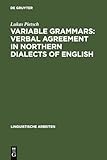Variable Grammars: Verbal Agreement in Northern Dialects of English / Lukas Pietsch.
Material type: TextSeries: Linguistische Arbeiten ; 496Publisher: Tübingen : Max Niemeyer Verlag, [2011]Copyright date: ©2005Description: 1 online resource (217 p.) : IllContent type:
TextSeries: Linguistische Arbeiten ; 496Publisher: Tübingen : Max Niemeyer Verlag, [2011]Copyright date: ©2005Description: 1 online resource (217 p.) : IllContent type: - 9783484304963
- 9783110944556
- 427 23
- PE1771 .P548 2005eb
- online - DeGruyter
- Issued also in print.
| Item type | Current library | Call number | URL | Status | Notes | Barcode | |
|---|---|---|---|---|---|---|---|
 eBook
eBook
|
Biblioteca "Angelicum" Pont. Univ. S.Tommaso d'Aquino Nuvola online | online - DeGruyter (Browse shelf(Opens below)) | Online access | Not for loan (Accesso limitato) | Accesso per gli utenti autorizzati / Access for authorized users | (dgr)9783110944556 |
i-iv -- Contents -- List of maps. List of figures. List of tables -- List of abbreviations -- Acknowledgments -- 1. Introduction -- 2. Theoretical accounts of verbal agreement variation -- 3. History and origins of the NSR -- 4. Verbal agreement in the SED -- 5. Verbal agreement in the NITCS -- 6. Verbal agreement in FRED -- 7. Conclusions -- Appendixes -- Index
restricted access online access with authorization star
http://purl.org/coar/access_right/c_16ec
One of the conspicuous characteristics of the northern dialects of Britain and Ireland is variation in verbal agreement, especially the use of plural verbal -s. Once a mark of a consistent, categorical grammatical system in the traditional dialects of the area, today verbal -s appears in highly complex, hybrid variation patterns in the modern vernaculars. This corpus-based study explores continuities and discontinuities between the dialects involved, and discusses the implications of such hybrid variable sytems for a usage-based theory of grammatical competence.
The northern dialects of Britain and Ireland have verbal agreement patterns that differ radically from those of Standard English: the children is singing vs. they are singing vs. they sing and dances. This so-called 'Northern Subject Rule' (agreement with adjacent personal pronoun subjects, but invariable verbal -s everywhere else), attested since the time of Middle English, was once a consistent, categorical grammatical system in the older dialects. It continues in the modern vernaculars in the form of complex variable systems, amalgamated from traditional dialectal patterns, Standard English forms, as well as modern supraregional vernacular influences. This study explores the variable use of verbal agreement forms in Scotland, northern England and Ulster, based on data ranging from the mid-20th century »Survey of English Dialects« up to dialect recordings of the 1990s. In analysing continuities and discontinuities between the different dialects involved, it also raises questions of a theoretical nature: what are the implications of these hybrid, variable systems for a usage-based theory of grammatical competence? Die Verbkongruenz in den nördlichen britischen Dialekten weicht auffällig vom Standardenglischen ab. Doch was in älteren Formen dieser Dialekte ein in sich geschlossenes System mit kategorischer Geltung war, tritt in modernen Varietäten stets variabel und in einer Vielfalt von Mischformen auf. Die Arbeit untersucht anhand von Korpora Kontinuitäten und Unterschiede zwischen den Dialekten dieser Region und diskutiert die Bedeutung solcher hybrider, variabler Systeme für eine Theorie der grammatischen Variation.
Issued also in print.
Mode of access: Internet via World Wide Web.
In English.
Description based on online resource; title from PDF title page (publisher's Web site, viewed 28. Feb 2023)


